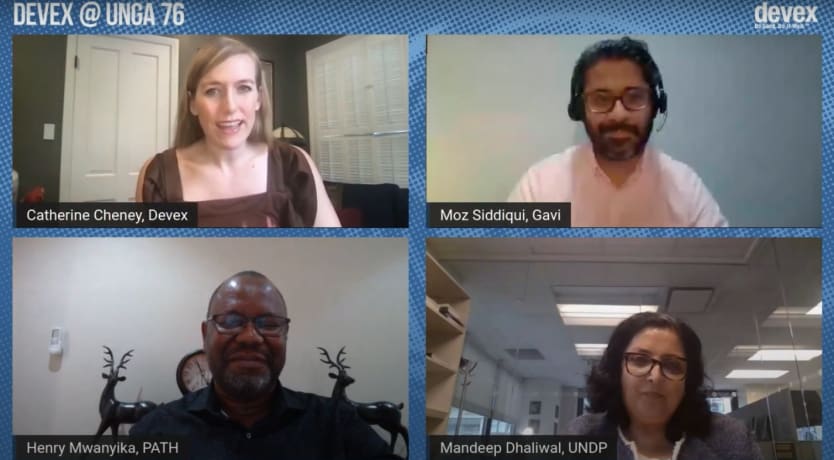
Access, trust, and scale go hand in hand when it comes to health care delivery — and sustainable development more broadly — in a world that is increasingly digital-first.
Coinciding with the 76th annual U.N. General Assembly, Devex will convene U.N. agency heads, government leaders, development practitioners, and private sector actors to discuss the most effective ways to build back better. Register here for our daily events.
“Half the world is still offline. … The majority of that is women,” said Dr. Mandeep Dhaliwal, director of the United Nations Development Programme’s HIV, health, and development group, during an event on digital health that Devex hosted Wednesday on the sidelines of the U.N. General Assembly. “Without deliberate direction to ensure that our digital health efforts redress that inequality, we will end up creating and … deepening existing inequalities.”
Closing the so-called digital divide will be essential in increasing access to digital health services, building trust in these tools, and taking digital health solutions to scale, she said.
Here are some other insights on building trust in digital health solutions from Devex events Wednesday:
1. Find visionary leaders, and put government in the driver’s seat
After Tanzanian Health Ministry professionals saw the success of a digital health initiative focused on immunization, they wanted to integrate data and technology across primary health care.
To develop a digital health investment road map, they worked with global health NGO PATH, which supports governments, the private sector, and donors to better utilize digital technologies for improved health services. PATH seeks “champions” within health ministries and then works with them in support of this vision.
“We always try to ensure that government is always on the driver’s seat, and for that to happen, we need to identify and build trust with visionary ... political and technical leaders,” said Henry Mwanyika, Africa regional director at PATH’s digital excellence center. “Through that trust, they will be able … first of all to see you as their trusted adviser instead of somebody who is coming in and to bring in a solution that responds to their priorities or priorities of the donor.”
PATH works with governments to develop costed investment road maps, a process that requires trust, a common vision, and patience, with the ultimate goal of the government having a sense of ownership of these digital health solutions.
2. Prioritize access for the most vulnerable
The Sustainable Development Goals pledge to “reach the furthest behind first.” Meanwhile, the COVID-19 pandemic has fast-tracked digital health innovation. But the more benefits these innovations bring, the greater the urgency to identify models that ensure the most vulnerable are not left even further behind.
Zuri Health, a company based in Nairobi, Kenya, launched a virtual health assistant service in January. Many telehealth companies are building products for smartphone users. But Zuri Health narrowed in on text messaging to reach underserved patients in need of health care services.
“What we decided to do at Zuri health was to build a product for Africans by Africa,” said Daisy Isiaho, a co-founder and chief product officer at the company, during a Devex discussion with health startup founders.
Tackling the issue of trust directly, Zuri Health’s services have end-to-end encryption to protect the privacy of users.
3. Establish safeguards for data protection
Many of the populations Dhaliwal focuses on in her work on HIV and AIDS at UNDP — including sex workers, men who have sex with men, and people who use drugs — are either criminalized or treated similarly to criminals in the countries where they live. They would be at risk if their sensitive data were leaked or ended up in the wrong hands, she said.
As the world races ahead with digitalization, a rights-based framework will be critical to ensure that laws and policies protect data privacy, Dhaliwal said.
“In the context of criminalized populations, it’s even more important to be able to assure the data protection and the security of the information that’s provided if we want to retain the trust for populations,” she said.
This must involve not just health ministries but also other stakeholders in government, including ministries focused on law and technology, she said.
4. Demonstrate commitment to partners
Because digital health startups tend to come and go, new entrants often face skepticism. So to build trust, they must demonstrate their commitment.
An example is RxAll, which has developed an artificial intelligence solution to address the issue of poor access to high-quality medicines across Africa. The company is based in the United States and Nigeria, with plans to expand to a handful of other African countries in the coming months.
Trust with seller partners and government regulators will be critical as RxAll seeks to scale, said Adebayo Alonge, its co-founder and CEO.
Alonge and his team have to make it “very clear to them that we’re here to stay,” he said during the discussion with Isiaho.
5. Consider solving problems beyond health by taking a platform approach
Zenysis Technologies has developed a data interoperability platform aimed at improving the delivery of health care and other public services in low- and middle-income countries.
The company provides an example of how digital health technology can help governments address a problem, such as strengthening national childhood vaccination, in a way that sets the country up for success to tackle a whole range of issues, said Moz Siddiqui, head of strategic innovation and partnerships at Gavi, the Vaccine Alliance.
Gavi has supported Zenysis through a program known as INFUSE — or Innovation for Uptake, Scale and Equity in Immunisation.
And while Gavi’s interest is increasing access to vaccination, the work that Zenysis is doing can help governments deal with the problem of fragmented data across other health care priorities, Siddiqui said.
“Central to the idea of trust is really … trust that this is the right priority,” he said. Siddiqui’s advice for donors, NGOs, companies, and others seeking to take digital health solutions to scale was to consider building platforms that can be deployed to address a number of problems.
“When you start looking at digital health and being able to understand the range of priorities, it’s important that you pick on those areas that … can be solved for a problem in the here and now — but also look into the future,” Siddiqui said.
The use cases can extend beyond health, he said, adding that digital transformation extends across the SDGs.
Search for articles
Most Read
- 1
- 2
- 3
- 4
- 5








